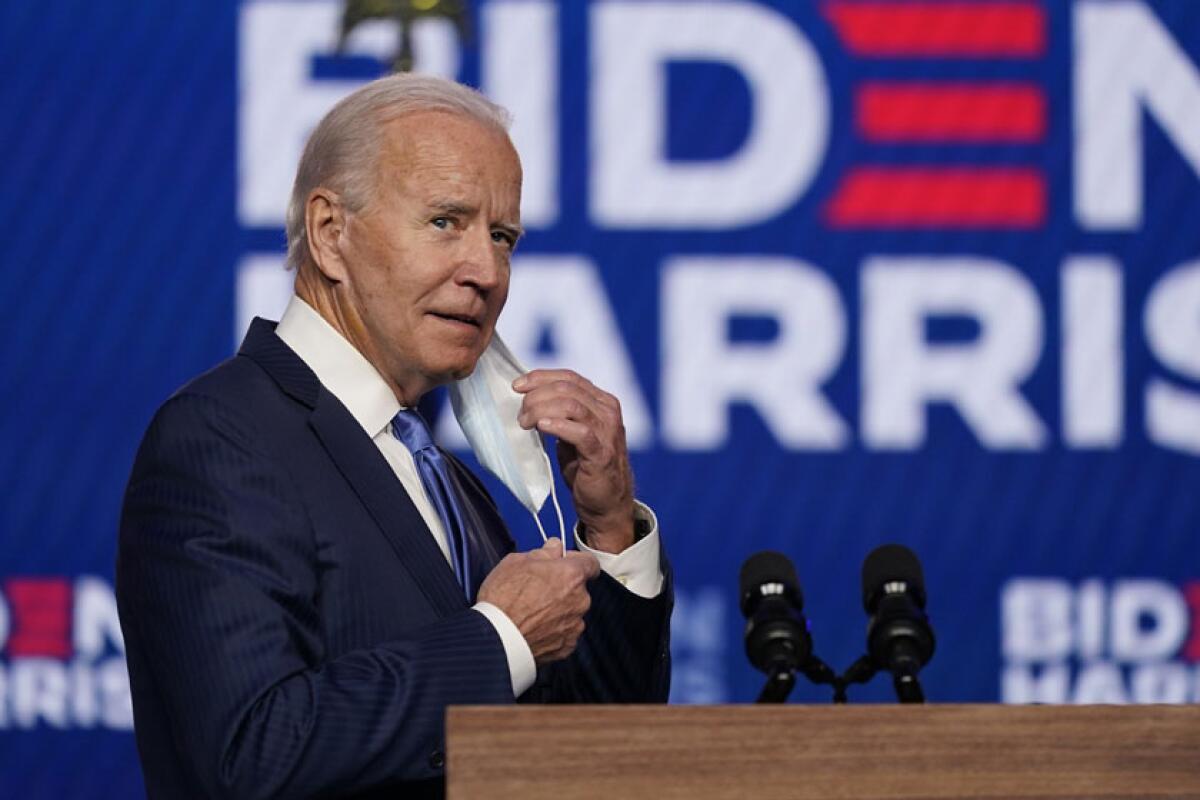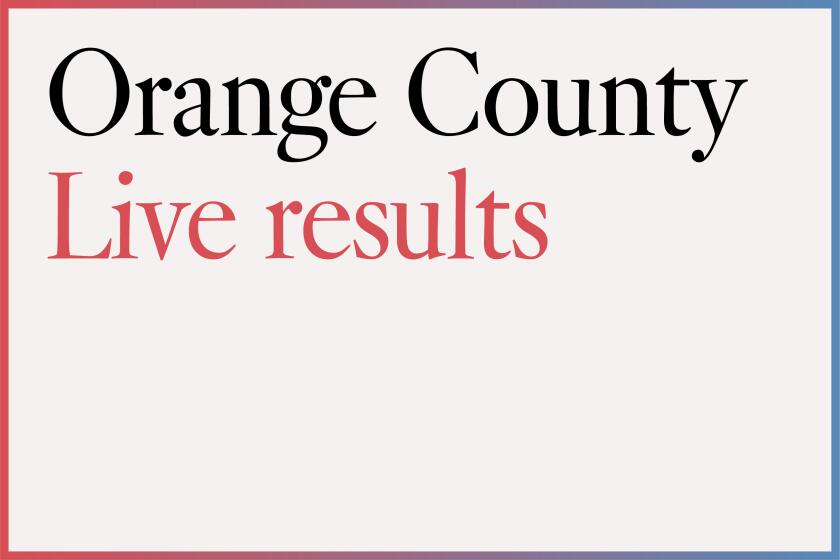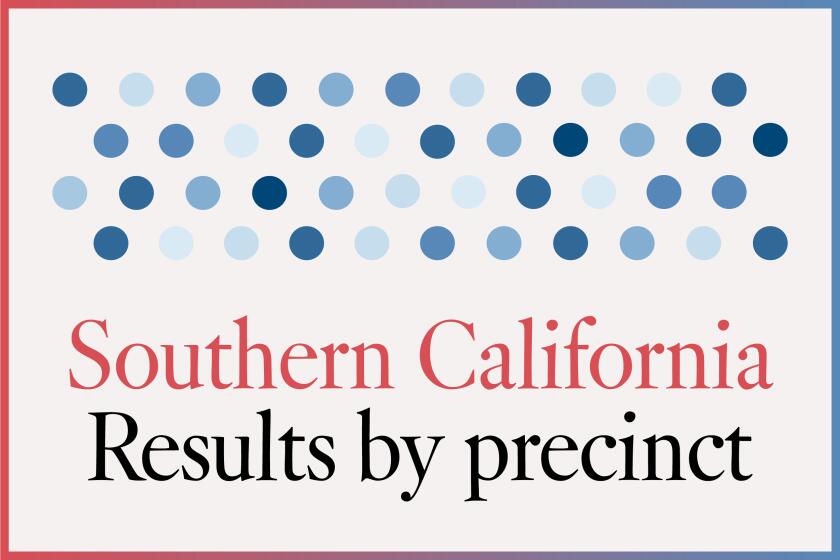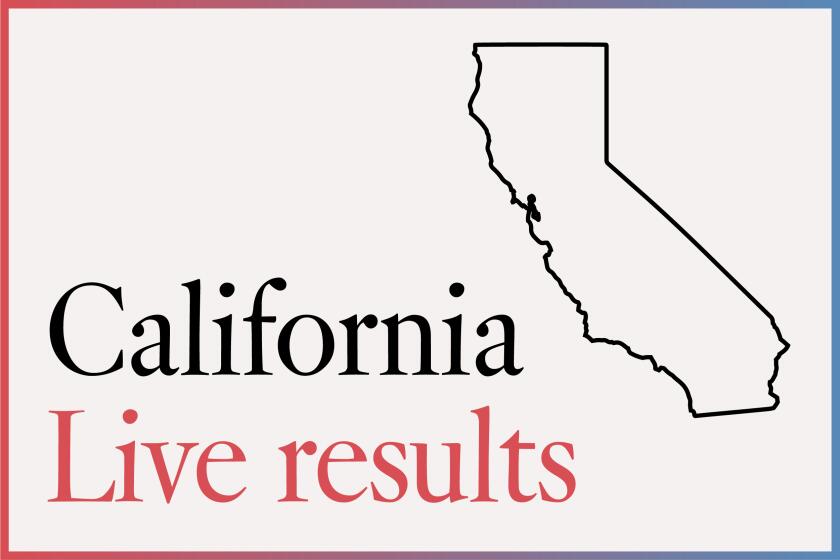Orange County backed Biden, but Republicans poised for dramatic comeback after ‘blue wave’

- Share via
Like many conservative voters in Orange County, Carolyn Ehret, a longtime Republican in Laguna Niguel, could not stomach voting for Donald Trump a second time. So she split her ticket to support Joe Biden and her district’s Republican congressional candidate, Michelle Steel.
“Trump’s just gutted me, he’s not a good example for any of us,” said Ehret. “We need to become civilized again.”
For the record:
10:59 a.m. Nov. 7, 2020The Times incorrectly reported that Young Kim was leading Rep. Gil Cisneros in California’s 39th Congressional District 52.3% to 47.7%. Those numbers are only accurate for Orange County voters. She leads the entire district, which includes parts of Los Angeles and San Bernardino counties, by 50.5% to 49.5%.
Her vote reflects a lot about where Orange County, once a bastion of right-wing conservatism, stands politically these days, teetering between red and blue. Biden appears headed to victory, and so does Steel.
Democrats have made inroads over the last 30 years and now have a 3.5% advantage in voter registration that is likely to continue to grow. But the GOP is still a potent force in Orange County, with Republicans running the county power structure, thus controlling key entry points into politics.
“The Republican party is very strong at getting people appointed to boards and commissions,” said Karthick Ramakrishnan, a professor of political science and public policy at UC Riverside. Those appointees, he says, then already have critical name recognition when they run for office.
He said the county’s GOP stuck to an extensive plan — largely abandoned by the national party under Trump — that the Republican National Committee came up with in 2013, to become more inclusive through aggressive outreach to Black, Asian American, Latino, female and LGBTQ voters.
“Trump essentially shredded that playbook, but those efforts continued in Orange County,” said Ramakrishnan.
The result could be the election of the first two Korean American women in Congress. In the 48th District, Steel, a county supervisor, leads Democratic incumbent Harley Rouda, 50.8% to 49.2%. Challenger Young Kim, a former state assemblywoman, has opened a similarly slim lead over incumbent Gil Cisneros in their rematch for the 39th District, 50.5% to 49.5%.
Republican candidates lead two of California’s most competitive races in Orange County, taking back lost ground from 2018. The candidates, Young Kim and Michelle Steel, could be the first Korean American women in Congress.
Both Rouda and Cisneros were elected as part of the 2018 “blue wave” that saw Democrats sweep the county’s seven congressional seats. That year, Cisneros beat Kim by about three percentage points and Rouda prevailed by more than seven percentage points over longtime incumbent Dana Rohrabacher in the most conservative part of the county.
But no one took Rouda’s victory to mean the 48th District — the heart of John Wayne country, with Huntington Beach and Newport Beach at its core — had turned liberal. Rohrabacher was a quirky figure. A pro-marijuana maverick prone to strange, off-the-cuff statements, he vilified communists and undocumented immigrants as Orange County politicos of yore had done, at a time when much of the county had grown past that. And his close ties to Russian President Vladimir Putin became a significant liability after the Russian interference in the 2016 election.
“Michelle Steel is a far stronger candidate than Dana Rohrabacher, who had his own issues,” said Fred Smoller, an associate professor of political science at Chapman University.
Biden, meanwhile, has maintained a healthy lead over Trump countywide — 53.7% to 44.4%, a gap of roughly 131,000 votes as ballots are still being counted. Hillary Clinton beat Trump in the county four years ago by a margin of 50.9% to 42.3%. In 2012, Republican candidate Mitt Romney prevailed over then-President Barack Obama by more than 6 percentage points.
Trump has struggled across the country in diverse suburbs with large numbers of college-educated residents like this one. Orange County is 34% Latino and 21.7% Asian. But Romney’s easy win here in 2012 suggests that a more traditional Republican could still prevail.
The fact that the GOP could make gains at the congressional level, even if Trump loses the county by a sizable margin overall, shows that “the Republican Party is not dead” in the region, according to Smoller.
“It always used to be red, it wasn’t even worth talking about because everything was red,” Smoller said. “But now you’re going to see competitive races: Some are going to go to Democrats, some to Republicans and several of them are going to be very, very close.”
They might not be as red hot as this election. Passions for and against Trump helped drive a “remarkable turnout,” with 77% of registered voters casting ballots, said Louis DeSipio, a professor of political science and Chicano/Latino studies at UC Irvine.
“He’s a very polarizing figure and that sort of polarization, at least when it sort of attaches to Orange County, advantaged the Democrats — because even sort of Republican-leaning voters here are more alienated by his immigration message” and his response to the COVID-19 pandemic, DeSipio said.
But, DeSipio added, in general Republicans have a “rhetorical advantage” with voters over taxes. Steel’s main line of attack, for instance, was to claim that Rouda wanted to raise taxes, which he denied.
Another reason Orange County’s bluer tint may not be uniform up and down the ballot, DeSipio said, is that old habits die hard.
“That reflects that some of the sort of long-term legacies in the community remain,” he said. “People don’t just sort of flip overnight from being a Republican to being a Democrat or an independent to a Democrat.”
Sarah Stanley, 24, of Aliso Viejo still sees her community as a bastion of conservatism. She takes pride in her family’s military background. Stanley voted for Trump and voted along party lines down her ballot.
Her boyfriend is currently enlisted in the Army but might not reenlist if Biden is elected.
“We’re quite scared for our future if Biden ends up winning, because if [my boyfriend] doesn’t reenlist, we’re going to miss out on all of the benefits we currently get,” Stanley said.
Tracy Drivas, a 62-year-old real estate agent in Irvine, voted for Trump in 2016 and is still a registered Republican who voted for the 45th-district Republican congressional candidate Greg Raths in this election. But she couldn’t fill in the Trump bubble. “The way Trump handled COVID was a travesty,” she said. “He’s just a vile human being.”
She voted for Biden.
On Ortega Highway in San Juan Capistrano, Robert Hunt, a registered independent from Laguna Niguel, monitored a Trump merchandise pop-up shop Friday. The 60-year-old didn’t care for Trump’s campaign, and explained that he ran the pop-up only to make money because his professional sports company went out of business due to the pandemic.
“Trump is an idiot and Biden is useless,” he said. But his passions were still high enough to vote for president. He wrote in the name of someone who wasn’t even running, former U.S. Sen. and 2000 vice presidential nominee Joe Lieberman.
More to Read
Sign up for Essential California
The most important California stories and recommendations in your inbox every morning.
You may occasionally receive promotional content from the Los Angeles Times.
















